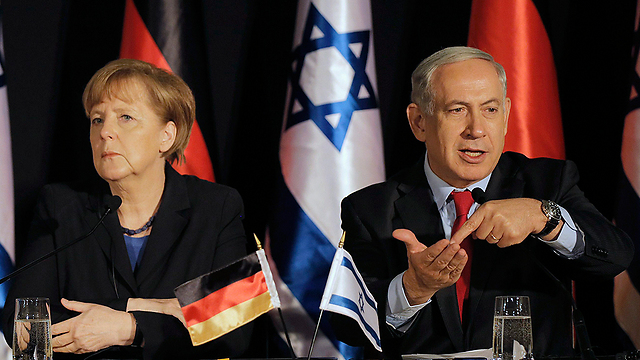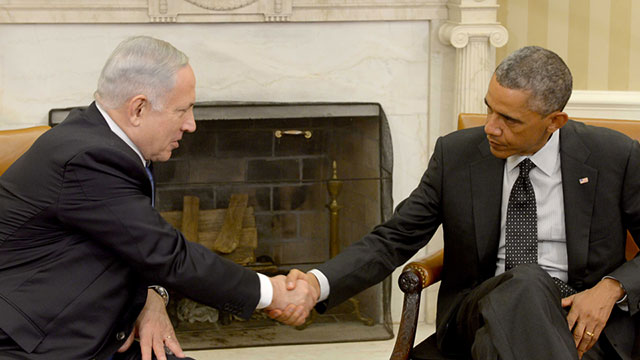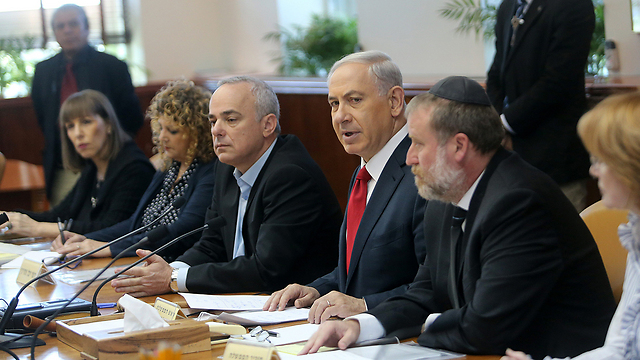
'We will see more European countries recognize Palestine'
Hugh Lovatt, the Israel-Palestine coordinator at European Council on Foreign Relations, tells Ynet that European governments are taking a more pro-Palestinian stance, starting to believe Netanyahu is not interested in peace.
At the end of October, Sweden’s center-left government officially recognized the state of Palestine, becoming the first major European country to do so. Ynet talked to Hugh Lovatt, the London-based Israel/Palestine Project Coordinator with the European Council on Foreign Relations about the chances that other European member states will follow Stockholm's lead.
Sweden officially recognized the state of Palestine. Was this a singular act within the European Union or do we have to expect other member states to follow suit?
I think indeed that a lot of the reasons that has lead Sweden to recognize Palestine is part of a wider European phenomenon. Of course the internal dynamics in Sweden are different to the UK and other member states. But there are two things found almost all over Europe: A growing frustration with Prime Minister Netanyahu’s policies towards the so called peace process, combined with a swing within the public opinion towards a position that is more sympathetic to the Palestinians.
Which European countries are most likely to take such a step?
In this very moment you don’t see a massive appetite for other countries to go down this route. But that does not mean it will not happen. In countries such as the UK, Ireland and also Spain, the debate is happening on the parliamentary level.
The British Parliament just voted in favor of the government recognizing Palestine as a state in mid October. The Spanish socialist party introduced a similar motion. Ireland's Upper House has also voted to recognize the Palestine state. Likely this will also happen in other countries.
Also important is to look at the lower level. Take the French Foreign Minister Laurent Fabius for example. He basically said that France would assume its responsibilities towards the Palestinians and recognize a Palestinian state if negotiations will not see as being viable.

So what you are saying is that other European member states will take further steps as soon as they consider the peace process to have failed?
That is at least very likely to me. Important is the broader picture. Assuming the Palestinians will address the UN Security Council perhaps this year, perhaps in January. Assuming there will be a resolution presented on their behalf calling for negotiations based on a clear set of parameters and a clear deadline. If the United States vetoes this resolution in the UN Security Council, then I think you will see a lot of European member states that will come to the conclusion that obviously the negotiations led by (US Secretary of State) John Kerry are going nowhere.
We used to be stuck in the peace process for many years, but I think we are even more stuck now. There is this huge lack of political horizons that a lot of politicians in the EU recognize. If you see this happening, then what Sweden has done suddenly seems like a more attractive option for trying to get some movement towards a two-state solution.
Of course It is very difficult to say but I think if these two things happen – the US vetoes an UN Security Council resolution calling for a clear path to negotiations and the Netanyahu government is not changing its course – there is a very strong likelihood that within the next year we will see some more countries recognize Palestine. I’d take that very seriously, even though it will not become a blanket policy within the European Union any time soon. But I do think there will be certain countries moving in that direction.
What you say involves a lot of uncertainties. Let’s stick to the facts. In all other countries but Sweden – as you said – the debate is taking place on a parliamentary level. In Ireland and Spain as well as in the UK it is the opposition that considers recognition of Palestine, not the elected government. Doesn’t that make a huge difference?
Yes, of course. But the opposition sometimes becomes the government. So it is very interesting that in the case of the British parliament debate the entire Labour Party shadow cabinet voted for Palestinian recognition. So if Labour comes into power next year, it is going to have this vote as precedent, and I am not sure how you can get out of that.
We have seen other politicians change their mind as soon as they came into power…
Sure. But it is very difficult. What is also very notable is that a lot of those who voted for the motion after the four hours debate in the House of Commons were people perceived as being pro-Israel. If I were an Israeli diplomat, this is something that would actually alarm me. It’s the friends of Israel. This really does show the increasing frustration with the direction that the current Israeli government is going in.
In addition to that you have this swing of European publics towards a more pro-Palestinian position as I already mentioned earlier. The last two Gaza wars played an important role in this swing. This phenomenon is seen in most European countries. We did some research on this. Basically almost every single member state is facing this swing, sometimes bigger, sometimes smaller, but it was nevertheless present. Most governments are following this swing. They are somewhat behind the curve but they are following it. Politicians are elected and they are held accountable for their decisions. If there is enough political pressure on them to make a certain decision then they will.
What about Germany? Will it always be the big exception in Europe?
Germany does come with baggage. It is very difficult for any German government to take a very critical position of Israel. Nevertheless you have seen also an increasing frustration on (German Chancellor Angela) Merkel’s part and the German government towards Israeli policies. (Prime Minister Benjamin) Netanyahu is not making it easy to be a friend of Israel at the moment in terms of the settlement policies and his decision to flout all European concerns.
And again, when Israel refuses to even listen to any European advice, the frustration this creates may lead to other decisions. Germany for example is very responsive to the discourse on upholding international humanitarian law. So for sure you won’t see a German state recognize a Palestinian state any time soon, but maybe we will see actions in different areas. Perhaps less high-profile, but that does not mean that they will remain idle.
Think of Germany’s position in the United Nations General Assembly in 2012. It was quiet noticeable that Germany abstained when it came to the vote to de facto recognize Palestine, when everyone thought they would actually oppose it. There are different theories why this happened and undoubtedly one was this deep frustration with Netanyahu, who just before the vote announced more settlements.
So if Israel and its government are the reason why the peace process is failing - as you say - what do you think needs to be done?
To avoid European member states going down this road, Israel has to actually hold up the prospect of a meaningful peace process. In the last nine months, Netanyahu did not retrench his positions, actually he got the US to move closer to his positions. Quite an accomplishment.
But fundamentally there was the stance that Netanyahu and all the Israeli government are interested in - maintaining the status quo and using the peace process not as a conflict resolution mechanism but as a conflict management mechanism. Together with the ongoing building of settlements, this makes European leaders come to the conclusion Netanyahu is just not interested in peace with the Palestinians or creating a Palestinians state that Europe would recognize as such.

This sounds quite cynical when you take into account what is going on right now. There were more Israelis killed in the past month than in the last two years. What about Israel’s security?
Israel’s security is a paramount consideration for European states and also the US. Having said that, I very much believe that a democratic Israel that lives side by side with a Palestinian state in peace is ultimately a lot better for Israel’s security then one that lives by the sword continuously.
If it is purely a matter of security, there are things that have been discussed and that can be discussed. The Palestinians themselves have basically agreed to a demilitarized state. They have agreed to some sort of limited Israeli or third party presence in the Jordan Valley after Palestinian statehood. If you look at the instability in the occupied territories at the moment, it is in areas controlled by Israel. The areas under the control of the PA are stable. So the PA has proven itself to be a partner that is able to maintain security for the population of Israel.
But most importantly, I think this debate about security is a convenient way of sidestepping all the other issues. It is not really about security. Of course security is important. But security is achievable and there are ways of ensuring that this is happening. The current debate in Israel is only using security as a fig leaf, in order to avoid more perhaps politically costly discussions about borders, about the fate of settlers. So it seems much better for Netanyahu to avoid these matters and try to cast the Palestinians as the side that is resisting or opposing talks.
So given the European member states have the ear of both Israel and the Palestinians, what role should the European Union and the European governments have in restoring calm in Jerusalem and the rest of the country?
A lot of what has happened in the last few days and in Jerusalem over the last weeks on the Palestinian side is very much something that is happening at the local level, at the grassroots. That makes it difficult for the EU to have much of an impact. Contrary to what the Israeli spokespeople would be saying this is not something that has been premeditated or orchestrated by the PA or by Abu Mazen (Palestinian President Mahmoud Abbas). Even Hamas and Islamic Jihad, which released statements claiming responsibility, in fact had no control over those incidents.
These attacks are clearly an emotional reaction on the grassroots level, a reaction to almost 50 years of Israeli occupation, a reaction to a lack of a political horizon that Palestinians feel. Public opinion in Palestine still tends to see that armed resistance as the best option for creating a state and ending occupation based on the fact that 20 years of negotiations are worth nothing. There is no organization behind it. It is purely an individual reaction. And this makes it difficult for anyone to be in control, also the EU. But the EU can have an impact on Netanyahu and the Israeli opinion.
How?
Actually there are a variety of things happening in the EU on a member-state level. Taken individually it does not seem very significant, but take it together there is noticeable action happening. Also the EU itself is taking action by banning settlement products, for example. Take the Israeli chicken industry. Europe said we no longer want your chickens from the occupied territories and forced the Israeli chicken sector to actually differentiate between chickens raised in the occupied territories and those raised in Israel. The EU has done the same thing with vegetable products from the settlements.
This has a financial impact on Israel’s industry as the EU is Israel’s biggest trader. Israel is doing its best not to publicize what this impact is, but anecdotally it does seem to be something. What applies to fruit and chickens can also apply to the financial sector if there is the willingness to pursue it.
So let’s say the fact that every Israeli bank has a settlement branch can lead to the European decision that it does not want to do business with Israeli banks anymore. Suddenly Israeli banks would no longer be able to engage in transactions with European countries. Or visa issues. At the moment you have a visa free travel from Israel to Europe. Imagine suddenly because of the occupation Israelis no longer would be allowed to travel to Europe. That is the level on which EU sanctions would start to interfere with the normal life.

Do you really see these things coming?
It’s the kind of direction things are going in. I imagine this debate on labeling settlement products will continue and there is a whole other range of things that are increasingly being discussed. So I think there will be some sort of financial impact. In my view, the value of all this is not a financial impact. It is about creating a conversation within the Israeli society.
Take the guidelines that were mainly applied to the sector of research and academia. There has been this moment within the Israeli society when suddenly Israeli academic institutions publicly said, 'Hang on, we are going to lose funding because Israel does not sign up to the EU's conditions, which is an agreement to differentiate between settlement products.'
This was really driving a wedge between the settlers and all the pro-settler movements and average Israelis. The Israeli government saw this as a danger and it quickly signed on to the EU guidelines implicitly accepting this differentiation. If there is the political willingness to go down this path, then there is quite a bit that can be done by the EU.










